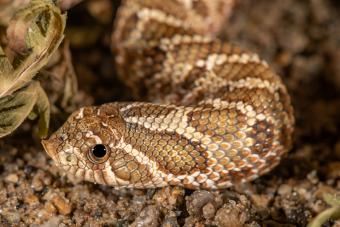
Snakes are fascinating creatures that continue to surprise us. For years, some scientists had thought snakes were completely deaf. Now, different findings prove this isn't the case. Snakes can hear, but not in the same way you do. Snakes use their hearing to detect vibrations, which helps them find food and mates. Although the research is limited, scientists are discovering more information about how a snake's hearing works.
Do Snakes Have Ears?
Snakes don't have ears like humans do. They lack external ears and an eardrum like ours, but they aren't deaf.
Instead of hearing through a tympanic membrane - also known as the ear drum - in the middle ear, like humans, snakes sense vibrations that sound produces through their quadrate and columella bones. Both are attached to the snake's jawbone. When these bones are stimulated by vibration, they send a signal to the inner ear.

Hearing Still Plays a Role
In comparison to their other senses, hearing is not one of the main senses snakes rely on for survival. That's why their hearing is not as advanced as many other animals. Although it's not the most important sense to snakes, it still plays a role in their survival strategy. Snakes primarily use their sight and strong sense of smell - in addition to vibrations from sound - to strike and capture their meal.
Snakes also use their ability to detect vibrations through the ground to avoid larger animals that may see them as their prey. It turns out that this is particularly important to help snakes avoid predators and injury. But they also use vibration to detect prey.
Some pet snakes do fine on pre-killed, frozen rodents, but others prefer live prey. This is because live prey stimulates their senses and prey drive.
Can Snakes Hear You?
Although snakes can't hear as well as humans do, they can hear you talking. Snakes can hear low frequencies, but research has indicated it must be under 600 Hz. The human voice ranges between 100 and 250 Hz. This means snakes can hear people, especially if they're being extremely loud. Your snake's hearing isn't as accurate as your dog, but it's still there.
A Snake's Primary Senses
When you think of snakes, you likely think of that slither of their tongue. This is actually vital to their survival. Snakes use their tongue to collect information from the outside world. The sensory cells associated with an organ called the Jacobson's organ help them smell their food when they lick the air.
No Blanket Statement
Not every snake has the same range of hearing. Some snakes can hear better than others. All snakes appear to have the same ear anatomy, but each snake species requires different adaptations for their environment.
According to the article that appeared in Plos One, "Sound garden: How snakes respond to airborne and groundborne sounds," there is behavioral variability between different snake species when it comes to how they respond to sounds. Basically, researchers aren't sure yet how different species use sound to survive.
Understanding Snake Hearing
Research into the snake's ear anatomy and hearing will continue, especially now that the myth that they are deaf has been debunked. Yes, snakes can hear you, and they rely on their sense of hearing to help survive. Keep this in mind when housing your snake, and make sure you don't exponse them to noises or vibration that might stress them out.







